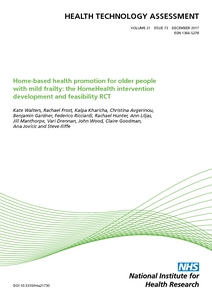Walters, K;
Frost, R;
Kharicha, K;
Avgerinou, C;
Gardner, B;
Ricciardi, F;
Hunter, R;
Liljas, A;
Manthorpe, J;
Drennan, V;
et al.
Walters, K; Frost, R; Kharicha, K; Avgerinou, C; Gardner, B; Ricciardi, F; Hunter, R; Liljas, A; Manthorpe, J; Drennan, V; Wood, J; Goodman, C; Jovicic, A; Iliffe, S
(2017)
Home-based health promotion for older people with mild frailty: the HomeHealth intervention development and feasibility RCT.
Health Technol Assess, 21 (73).
pp. 1-128.
ISSN 2046-4924
https://doi.org/10.3310/hta21730
SGUL Authors: Drennan, Vari MacDougal
![[img]](http://sgultest.da.ulcc.ac.uk/109434/1.hassmallThumbnailVersion/Walters%20et%20al%20Full%20Report%203011819.pdf)  Preview |
|
PDF
Published Version
Available under License ["licenses_description_publisher" not defined].
Download (1MB)
| Preview
|
Abstract
BACKGROUND: Mild frailty or pre-frailty is common and yet is potentially reversible. Preventing progression to worsening frailty may benefit individuals and lower health/social care costs. However, we know little about effective approaches to preventing frailty progression. OBJECTIVES: (1) To develop an evidence- and theory-based home-based health promotion intervention for older people with mild frailty. (2) To assess feasibility, costs and acceptability of (i) the intervention and (ii) a full-scale clinical effectiveness and cost-effectiveness randomised controlled trial (RCT). DESIGN: Evidence reviews, qualitative studies, intervention development and a feasibility RCT with process evaluation. INTERVENTION DEVELOPMENT: Two systematic reviews (including systematic searches of 14 databases and registries, 1990-2016 and 1980-2014), a state-of-the-art review (from inception to 2015) and policy review identified effective components for our intervention. We collected data on health priorities and potential intervention components from semistructured interviews and focus groups with older people (aged 65-94 years) (n = 44), carers (n = 12) and health/social care professionals (n = 27). These data, and our evidence reviews, fed into development of the 'HomeHealth' intervention in collaboration with older people and multidisciplinary stakeholders. 'HomeHealth' comprised 3-6 sessions with a support worker trained in behaviour change techniques, communication skills, exercise, nutrition and mood. Participants addressed self-directed independence and well-being goals, supported through education, skills training, enabling individuals to overcome barriers, providing feedback, maximising motivation and promoting habit formation. FEASIBILITY RCT: Single-blind RCT, individually randomised to 'HomeHealth' or treatment as usual (TAU). SETTING: Community settings in London and Hertfordshire, UK. PARTICIPANTS: A total of 51 community-dwelling adults aged ≥ 65 years with mild frailty. MAIN OUTCOME MEASURES: Feasibility - recruitment, retention, acceptability and intervention costs. Clinical and health economic outcome data at 6 months included functioning, frailty status, well-being, psychological distress, quality of life, capability and NHS and societal service utilisation/costs. RESULTS: We successfully recruited to target, with good 6-month retention (94%). Trial procedures were acceptable with minimal missing data. Individual randomisation was feasible. The intervention was acceptable, with good fidelity and modest delivery costs (£307 per patient). A total of 96% of participants identified at least one goal, which were mostly exercise related (73%). We found significantly better functioning (Barthel Index +1.68; p = 0.004), better grip strength (+6.48 kg; p = 0.02), reduced psychological distress (12-item General Health Questionnaire -3.92; p = 0.01) and increased capability-adjusted life-years [+0.017; 95% confidence interval (CI) 0.001 to 0.031] at 6 months in the intervention arm than the TAU arm, with no differences in other outcomes. NHS and carer support costs were variable but, overall, were lower in the intervention arm than the TAU arm. The main limitation was difficulty maintaining outcome assessor blinding. CONCLUSIONS: Evidence is lacking to inform frailty prevention service design, with no large-scale trials of multidomain interventions. From stakeholder/public perspectives, new frailty prevention services should be personalised and encompass multiple domains, particularly socialising and mobility, and can be delivered by trained non-specialists. Our multicomponent health promotion intervention was acceptable and delivered at modest cost. Our small study shows promise for improving clinical outcomes, including functioning and independence. A full-scale individually RCT is feasible. FUTURE WORK: A large, definitive RCT of the HomeHealth service is warranted. STUDY REGISTRATION: This study is registered as PROSPERO CRD42014010370 and Current Controlled Trials ISRCTN11986672. FUNDING: This project was funded by the National Institute for Health Research (NIHR) Health Technology Assessment programme and will be published in full in Health Technology Assessment; Vol. 21, No. 73. See the NIHR Journals Library website for further project information.
| Item Type: |
Article
|
| Additional Information: |
© Queen’s Printer and Controller of HMSO 2017. This work was produced by Walters et al. under the terms of a commissioning contract issued by the Secretary of State for Health. This issue may be freely reproduced for the purposes of private research and study and extracts (or indeed, the full report) may be included in professional journals provided that suitable acknowledgement is made and the reproduction is not associated with any form of advertising. Applications for commercial reproduction should be addressed to: NIHR Journals Library, National Institute for Health Research, Evaluation, Trials and Studies Coordinating Centre, Alpha House, University of Southampton Science Park, Southampton SO16 7NS, UK. |
| Journal or Publication Title: |
Health Technol Assess |
| ISSN: |
2046-4924 |
| Language: |
eng |
| Dates: |
| Date | Event |
|---|
| December 2017 | Published | | September 2017 | Accepted |
|
| Publisher License: |
Publisher's own licence |
| Projects: |
|
| PubMed ID: |
29214975 |
 |
Go to PubMed abstract |
| URI: |
http://sgultest.da.ulcc.ac.uk/id/eprint/109434 |
| Publisher's version: |
https://doi.org/10.3310/hta21730 |
Statistics
Item downloaded times since 03 Jan 2018.
Actions (login required)
 |
Edit Item |



